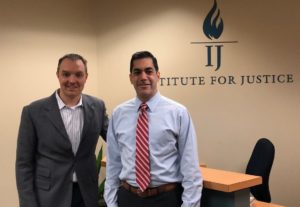Below is the exclusive transcript of David Gregory interviewing me on Meet The Press last week, discussing gun control issues in the wake of the Sandy Hook tragedy. I can’t give link to video because this didn’t actually happen, probably because they didn’t invite me. It’s like they don’t even know who I am! But, if David Gregory would have asked me the questions he asked Wayne LaPierre [real transcript here], these are the answers I would have given. They are the answers LaPierre should have given.
Before we get to the “transcript,” a note: some of this post is lighthearted, at least as to my “appearance” on Meet the Press and me not being invited on as a guest. I am not at all lighthearted about what happened at Sandy Hook, Columbine, the Aurora, Colorado theater, or any other tragedy. I hope you don’t interpret the lighthearted portions of this post as any disrespect or callousness to the victims or their families. As Rick Warren said on Fox News Sunday, “The deeper the pain, the deeper the grief, the fewer the words.” For this, there are no words.
 David Gregory: This Sunday morning it’s been nine days since the tragic shooting at Sandy Hook Elementary in Newtown, Connecticut. And the debate over gun control has been revived. Here with us exclusively this morning, the man at the center of that debate at the moment, the lawyer and Free Radical blogger, Michael Lovins, who is answering questions for the first time since the shootings. I want to get right to it. Welcome back to the program.
David Gregory: This Sunday morning it’s been nine days since the tragic shooting at Sandy Hook Elementary in Newtown, Connecticut. And the debate over gun control has been revived. Here with us exclusively this morning, the man at the center of that debate at the moment, the lawyer and Free Radical blogger, Michael Lovins, who is answering questions for the first time since the shootings. I want to get right to it. Welcome back to the program.
Michael Lovins: First, thank you for having me, but I’m not “back” to the program. I’ve never been on your program before, and I’m not even here now. But I’m not bitter.
DG: You proposed armed guards in school. We’ll talk about that in some detail in a moment. You confronted the news media. You blamed Hollywood and the gaming industry. But never once did you concede that guns could actually be part of the problem. Is that a meaningful contribution, Mr. LaPierre, or a dodge?
ML: Of course it’s not a dodge, David. And of course, guns are part of the problem. But guns can’t bear responsibility. They aren’t moral agents. Guns don’t make choices. They are inanimate objects, useful for good or evil. Blaming guns is like blaming cars for motor vehicle accident deaths. And, let’s say we all agree that guns are the problem. What does that mean? Ban them all? Nobody thinks that’s going to happen in America. And even if we did ban all firearms today, how long would it take for all firearms to be completely out of circulation? It would be years, at least, and more likely never. Heroin is illegal, but still available. So, it’s not a dodge, it’s simply a focus on the things that can actually make a difference in the real world.
DG: So you think that putting armed guards in schools is the one and only thing that should be done in response to these mass shootings in schools? You don’t think guns should be part of the conversation? [This is an amalgamation of questions]
ML: Obviously, armed guards are not the only thing. We need to make some major changes in how we deal with mental illness. I think that Hollywood and video game makers need to take a very serious look at the violent material they produce. But those things are way outside my area of expertise, and I don’t want to pretend to be an expert in an area where I’m not. And, these things will take a very long time to have an effect. Armed guards can be in place in a relatively short period of time, and they are effective immediately once they are in place.
DG: There were armed guards at Columbine. They exchanged fire with the shooters. So your principle of having armed guards was true in Columbine, was it not? And it didn’t stop the carnage. [again, an amalgamation of questions]
ML: Let me make two points about that, David. First, yes, there was an armed guard at Columbine. But, nobody ever said that having armed guards will be 100% protection. Second, and this is hugely important, law enforcement learned some really hard lessons from the Columbine tragedy. For one, you don’t wait for the SWAT team, like they did at Columbine. That wasted precious time and cost lives. Simply having guns in the hands of good guys is not enough on its own. Great training and procedures are necessary, too. But the bottom line is, the shooters at Columbine were eventually stopped by good guys with guns. I just think we should have someone there to stop them sooner.
Finally, the armed guard at Columbine was eating lunch when the shooting started, so he wasn’t there to prevent it from starting. And then, once he was notified of what was going on, his presence bought significant time and saved lives. So, to say that the armed guard at Columbine didn’t help is just flat out wrong.
DG: So how many do you think you have to have on campus, and where? Is it sufficient to have them at the front of the school?
ML: That depends upon each specific campus. There is no one size fits all solution. The situation at each campus needs to be assessed by security and law enforcement personnel and then make that assessment for that specific campus.
DG: Do you allow volunteers, or do they have to be police officers? Would you have volunteer forces there?
ML: I don’t believe in dictating details of implementation from Washington. Those decisions can and should be made locally. Frankly, I don’t think that we should force every school to have an armed guard. If the people locally don’t want that for their schools, that should be their right to choose. (I know “I” said some things in my press conference that contradict this, but I’m smarter now.)
DG: But you would concede that, as good as an idea as you think this is, it may not work. Because there have been cases where armed guards have not prevented this kind of massacre, this kind of carnage. I want you would concede that point, wouldn’t you?
ML: Of course it won’t work to stop ALL deaths. Airbags in cars don’t stop ALL deaths, but nobody with any sense would say that’s a reason to stop putting airbags in cars. There are no perfect solutions, David. Ever. This is no exception. It would be better than the current situation, but not perfect. As terrible as Columbine was, it was slightly less terrible because there was someone there at the scene with a gun. I simply won’t let the perfect be the enemy of the good.
But another thing that you would see is that the schools that have armed guards would have fewer of these incidents to stop. We know that, as mentally disturbed as these shooters are, they are not stupid. They usually choose targets where they know they won’t be immediately confronted by someone armed and ready to stop them.
DG: And who pays? Because we know that a third of the schools that already have armed policemen or some kind of armed guards there. Will the N.R.A. be prepared to help financially? Is it really– is a budgetary matter feasible? Would federal grants be necessary to provide this kind of– firepower?
ML: First, it’s interesting that you act like anyone who advocates having armed guards at schools is a lunatic, and then you admit that 1/3 of schools already have them. Second, I think it should be paid for at the local level. As I said earlier, I don’t think every school should be forced against the will of the parents at that school to have armed guards. If they don’t believe it will be effective, or at least cost effective, that should be a choice that they make for themselves. I wouldn’t ever force them to do it, and I don’t think Dianne Feinstein should force them not to do it. Our budgetary situation is a mess, but it wouldn’t take a genius to go through the budget of any government–federal, state or local–and find some line items far less important than protecting our children.
DG: [Y]our standard is that fewer people should be killed. That’s the goal here. And the standard is, if it’s possible, your words, if it’s possible that lives could be spared, shouldn’t we try that? That’s your standard, isn’t it?
ML: Well, David, as good as that sounds, you can’t make simple formulations like that. How possible do you mean? Are you saying we should try something that has 1% chance of saving 1 life but will cost untold amounts in both money and liberty? If that’s your formulation, then no, I’m not for that. I recognize that that can sound cold, but it’s reality.
DG: Okay. So let me widen the argument. Let’s stipulate that you’re right. Let’s say armed guards might work. Let’s widen the argument out a little bit. So here is a magazine for ammunition that carries 30 bullets. Now isn’t it possible that, if we got rid of these, if we replaced them in said, “Well, you could only have a magazine that carries five bullets or ten bullets,” isn’t it just possible that we can reduce the carnage in a situation like Newtown?
ML: Possible? Sure. It’s possible. But it’s not likely to have much of a positive impact. First, you have to assume that criminals will obey the ban even while breaking other laws. We all know that’s just not serious analysis. Second, if a shooter has even a little bit of training or practice, it will take less than 5 seconds to change magazines. And that’s if he’s slow. So, banning so-called high capacity magazines has the primary effect of deluding people into thinking they’re helping when they are not. That’s actually worse than not helping because it gives a false sense of security that effectively prevents taking steps that actually help.
Third, I think it’s good to widen the argument, as you say, but we also need to widen the analysis beyond mass shootings. Lives are at stake in other contexts, too. Magazines are important for self-defense. Look at some of the video from the riots in Los Angeles in 1992 after the Rodney King verdict. You see some store owners with rifles and high capacity magazines standing in defense of their property. A mob or just several assailants coming at you is one of the times when a high capacity magazine makes a difference. Do you want to effectively prevent that store owner from protecting himself? In that situation, the high capacity magazine, which the rioters could see, actually saved lives. That’s the reality that the anti-gun lobby hates–that guns save lives, often without ever being fired.
Finally, if you really think that high capacity magazines have no legitimate use, let’s tell police officers that they can’t have them, either. I challenge an anti-Second Amendment congressman to propose a bill limiting law enforcement to the use of weapons with magazines holding less than 5 or 10 bullets.
DG: But here’s some– don’t take it from me. Here’s Larry Alan Burns, federal district judge of San Diego, he sentenced Jared Loughner, appointed by President Bush, a gun owner, and supports the N.R.A.. Here’s what he wrote in The Los Angeles Times: “Bystanders got to Tucson shooter, Jared Loughner and subdued him only after he emptied one 30 round magazine and was trying to load another. Adam Lanza, the Newtown shooter, chose his primary weapon as a semi-automatic rifle with 30-round magazines. And we don’t even bother to call the 100-rounder that James Holmes is accused of emptying in an Aurora, Colorado movie theater a magazine, it’s a drum. How is this not an argument for regulating the number of rounds a gun can fire? I get it. Someone bent on mass murder, who has only a ten-round magazine or a revolver at his disposal probably is not going to abandon his plan and instead try to talk his problems out. But we might be able to take the “mass” out of “mass shooting,” or at least make the perpetrator’s job a bit harder.”
ML: Would it make the perpetrator’s job a BIT harder? I suppose perhaps a bit. But not much. And, we can’t consider these things in a vacuum. At what cost do we make a perpetrator’s task minimally more difficult? And I don’t mean cost in dollars, I mean cost in liberty and lives. Again, if you really believe that there is no legitimate use for a magazine holding over 10 bullets, then get a bill to the floor of the Congress saying that the police can’t use them, either.
[I’m omitting a significant discussion about background checks. Don’t worry, though, because I have a good reason to leave it out: I haven’t decided what I think about background checks. I see pretty powerful arguments on both sides of this part of the debate, so I’ll keep my mouth shut until I can articulate why I think one argument is better than the others. I welcome your opinions in the Comments section.]
DG: Is there any new gun regulation that you could support?
ML: Well, “any” is pretty broad, so it’s hard to say that there’s not one single regulation that could be proposed that would be at least minimally beneficial. But our problem is not a lack of regulations, or a need for new ones. The biggest problem is how infrequently the good laws that are on the books are enforced. We let criminals with guns walk all the time for no particular reason, and then a criminal commits another crime with a gun, and the left automatically wants new laws against what was already illegal. Passing laws in itself doesn’t do much good. They have to be enforced.
DG: I’m asking you if there’s a new gun regulation, you know, after the debates of the ’90s and so forth, today. Could we make the assault weapons ban better, the ammunition ban any better, any more effective?
ML: Well, David, let’s be honest, the term “assault weapons” is just stupid. What weapon isn’t an “assault weapon”? Were the blades used by the hijackers on 9/11 assault weapons? Not if you apply the legal definition from the “assault weapons” ban. The legal definition was based on the cosmetics of the gun, not the operation or capabilities of the gun. So basically, if a gun looks really scary, it’s an “assault weapon.” Whatever regulations we have need to be smarter than that.
And wouldn’t you agree that we should only ban things that don’t have a legitimate use for self-defense? Then let’s apply this test to any proposed bans: if it’s banned for a law-abiding civilian citizen, then it’s banned for law enforcement. Individuals have a right to defend themselves. Relying on law enforcement alone is not reasonable because, even under the best circumstances, it often takes too long for law enforcement to arrive. If there really is no self-defense purpose for it, why do the police need it?
DG: But didn’t it strike you, Mr. LaPierre, that your goal is to reduce violence in this country, and I think back to the reaction after the Oklahoma City bombing, I think back to the reaction after 9-11, nobody said there was one thing that was going to work. Look at how extensive the federal government’s powers that they sought, (UNINTEL) wiretaps, all kinds of counter-terror procedures. Some work, some don’t.
But the feeling was they were worth trying. And that was your standard. That’s what you said on Friday. If it’s worth trying, why not do it? That’s your position on armed guards. And a lot of people would agree with you. But nothing having to do with gun safety. And you seem to excuse the role that guns play in violence in this country.
ML: David, I really mean no disrespect, but I have no earthly idea what you’re talking about. Of course we should try what is “worth trying,” as you put it. But what is “worth trying”? Is it worth trying what failed already, like the so-called assault weapons ban? Is it worth trying the death penalty for anyone who illegally owns a gun? What I’m saying is that re-instituting the so-called assault weapons ban is not worth trying because it makes things worse, not better. It sounds like what you’re advocating is just throw anything up there if it has even the vaguest chance of working, despite all past experience to the contrary. I don’t think that’s what you really mean, but that is what it sounds like to me. Frankly, I don’t think we should take that approach. I think it’s dangerous to lives and liberty.
And to say that we are doing nothing about gun safety shows that you have absolutely no idea what the NRA is all about. Gun safety training is one of the primary tasks of the NRA and we probably do more than any other organization in the world to promote gun safety.
DG: Has the environment changed, Mr. LaPierre [I’m sure Mr. Gregory meant “Mr. Lovins,” but for some reason he called me Mr. LaPierre]? The Supreme Court has reaffirmed gun owners’ rights in this country. Mayor Bloomberg was on this program saying last week, “You tried to get the president not to be reelected.” You failed in that effort. He says you don’t have the clout that you had politically in this town in past debates. Do you have the same clout have always had politically? [another amalgamation of questions]
ML: Who thinks I ever single-handedly had the power to elect or un-elect presidents? Or any politician? I certainly never had that delusion. Any power I have now, had before, or ever will have, is nothing more than a derivative of the American people’s belief in their Second Amendment rights. Gun sales right now indicate that this belief remains very strong. I’m here today, I’ll be gone tomorrow. But the right to keep and bear arms will endure, even if it is infringed by an overreaching government.
DG: Mr. LaPierre [again with the wrong name], we thank you for your views.
ML: Thank you for [not] having me.
Talk to me.







